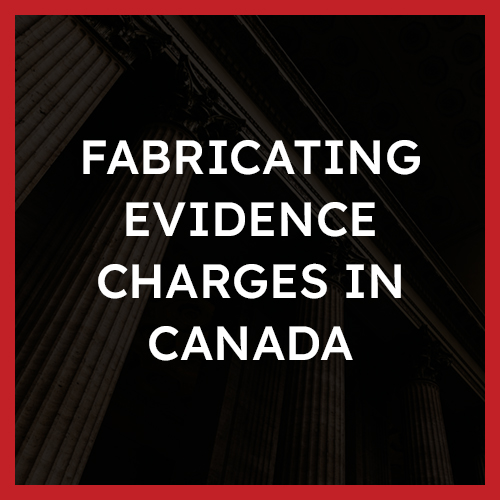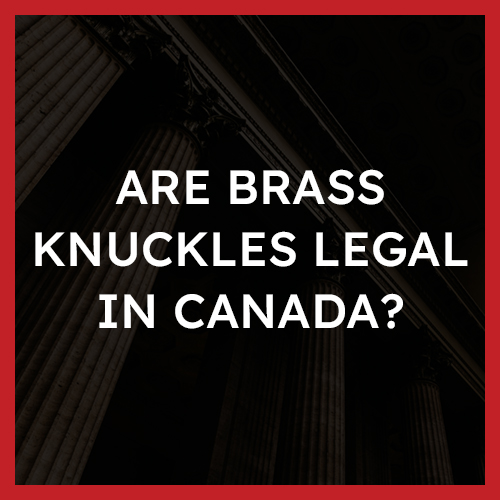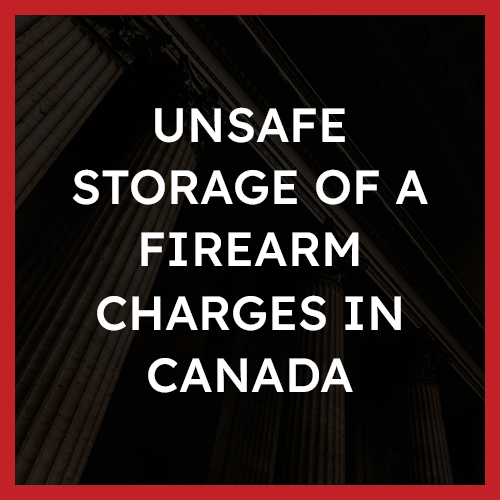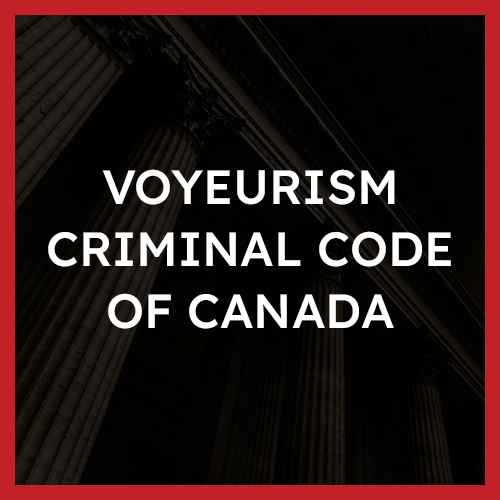Fabricating Evidence (s. 137) Laws in Canada
What is Fabricating Evidence?

Section 137 of the Criminal Code states that everyone who:
Fabricating evidence
137. Every one who, with intent to mislead, fabricates anything with intent that it shall be used as evidence in a judicial proceeding, existing or proposed, by any means other than perjury or incitement to perjury is guilty of an indictable offence and liable to imprisonment for a term not exceeding fourteen years.
Examples of Fabricating Evidence
Some examples of the offence of fabricating evidence may include::
- A police officer submits false notes or a false report on an event which occurred in order to provide evidence against an accused person. This may include exaggerating the facts of a circumstance where charges are laid, or outright lying about a situation.
- A doctor submits a medical report which is false in order to dispute or contradict evidence against a person
- A witness exaggerates and falsely reports an occurrence in order to provide evidence of a crime against another person
- A police officer planting drugs or weapons at a crime scene, or into another person’s possession, to falsely implicate them of a criminal offence.
- A person falsifies documents, such as creating fake invoices, receipts, or contracts to support a false claim in a judicial proceeding. This could be an accounting invoice or other document which falsifies evidence. This could be in an official (employment) capacity, or unofficial/informal capacity.
Defences
A strong defence to a charge of fabricating evidence will vary depending on the circumstances of what occurred.
However, some defences may be:
- The accused lacked intent. A necessary component of establishing the elements of the offence is the intention to mislead. If an accused person can demonstrate that they did not intend to fabricate evidence for the purpose of misleading a judicial proceeding, this argument may be accepted. However a lawyer should be consulted prior to putting such an argument forth. This defence could involve providing evidence that what the crown is alleging is fabricated evidence, was for a purpose entirely unrelated to the judicial proceeding.
- The accused’s actions were a mistake of fact. A lawyer should be consulted prior to raising such a defence, however a mistake of fact defence includes a genuine, mistaken belief that fabricating evidence was reasonable under the circumstances, and lacked intent.
- The identity of the accused, or date, time, or location which the offence occurred were not properly established by the police.
- There is a lack of material information which supports the allegation that the accused fabricated evidence. This may include a lack of documented evidence, physical evidence, or witness testimony.
- Duress or Necessity: in rare circumstances, if the accused was under considerable duress, and committed the offence of fabricating evidence in order to protect themselves or another person from imminent harm or death, this may be argued. An accused person should discuss this with their lawyer.
- The Charter: if evidence was obtained through an unreasonable search or seizure under section 8 of the Canadian Charter of Rights and Freedoms, such evidence can be excluded. Again, it is advisable to discuss the evidence seized and totality of the circumstances with a lawyer.
Punishment
The maximum penalty for a conviction under Section 137 is fourteen (14) years imprisonment. Fabricating evidence is a straight indictable offence.
Whether you intend to plead guilty to a charge under section 137, it is important to consult a lawyer prior. There may be factors which apply to your punishment/sentencing which are relevant and important for consideration, which may result in a lesser punishment.
Overview of the Offence
According to s. 119, 120 of the Criminal Code:
Bribery of judicial officers, etc.
119 (1) Every one is guilty of an indictable offence and liable to imprisonment for a term not exceeding fourteen years who
(a) being the holder of a judicial office, or being a member of Parliament or of the legislature of a province, directly or indirectly, corruptly accepts, obtains, agrees to accept or attempts to obtain, for themselves or another person, any money, valuable consideration, office, place or employment in respect of anything done or omitted or to be done or omitted by them in their official capacity,
or
(b) directly or indirectly, corruptly gives or offers to a person mentioned in paragraph (a), or to anyone for the benefit of that person, any money, valuable consideration, office, place or employment in respect of anything done or omitted or to be done or omitted by that person in their official capacity.
Consent of Attorney General
(2) No proceedings against a person who holds a judicial office shall be instituted under this section without the consent in writing of the Attorney General of Canada.
Bribery of officers
120. Every one is guilty of an indictable offence and liable to imprisonment for a term not exceeding fourteen years who
(a) being a justice, police commissioner, peace officer, public officer or officer of a juvenile court, or being employed in the administration of criminal law, directly or indirectly, corruptly accepts, obtains, agrees to accept or attempts to obtain, for themselves or another person, any money, valuable consideration, office, place of employment with intent
(i) to interfere with the administration of justice,
(ii) to procure or facilitate the commission of an offence, or
(iii) to protect from detection or punishment a person who has committed or who intends to commit an offence; or
(b) directly or indirectly, corruptly gives or offers to a person mentioned in paragraph (a), or to anyone for the benefit of that person, any money, valuable consideration, office, place or employment with intent that the person should do anything mentioned in subparagraph (a)(i), (ii) or (iii).
Fabricating evidence is an offence under section 137 of the Criminal Code of Canada. The section defines the offence as an attempt to subvert justice by seeking to alter the outcome of a case of trial by introducing false evidence. This section is designed to safeguard the integrity of the judicial process. Fabricating evidence may occur in a variety of ways, such as an attempt by a person to evade prosecution by introducing false evidence, or with the intention to falsely convict another person of a crime.
Fabricating evidence is viewed as a serious offence by the courts, as it compromises the integrity of the judicial process in that by committing this offence, a person may ultimately seek to subvert the administration of justice.
In order for a person to be convicted of fabricating evidence in criminal court, the crown is required to prove their case beyond a reasonable doubt. The crown must also prove several elements of the offence, such as: confirming the accused’s identity, the date(s) and time(s) which the incident(s) occurred, the jurisdiction that the accused intended to fabricate evidence by their actions. The presumption of innocence applies in that the accused is presumed innocent until convicted of the offence.
The Guilty Act (Actus Reus)
The actus reus for the offence of fabricating evidence is established by proof, beyond a reasonable doubt, of the following:
- The accused committed the act of falsifying information, or other material, which was used or would be used as evidence
The Guilty Mind (Mens Rea)
The mens rea for fabricating evidence is established by proof, beyond a reasonable doubt, of the following:
- The accused knowingly committed this act, and demonstrated an intention to deceive or mislead the courts or judicial process by falsifying information, with the intention of causing a miscarriage of justice as a result.
Defences
How to beat a charge of fabricating evidence
Each circumstance is different, and the best defence available is contextual based on the details. Fabricating evidence is a serious offence. However, the following are some common defences that may be used against a charge of fabricating evidence:
Proving the identity of the accused
There are several aspects to this defence, however, one may rely on whether there was evidence seized by the police, which directly implicates the accused. The accused’s identity, as well as the date, time, and location of the offence, are all necessary elements for the crown to prove beyond a reasonable doubt.
Lack of Knowledge/Honest Mistake/No Mens Rea or Mental Intent
Lack of knowledge may also be raised as a defence in some circumstances if the accused can prove that they did not know that the material which they fabricated was integral and would ultimately cause harm or a miscarriage of justice.
This could also apply to circumstances where a person is accused of fabricating evidence, when they did not know what they were documenting or preparing would be taken as such for evidentiary value.
For example, if a person is employed and under the supervision of a manager or boss, who is directing them to complete tasks, and they are unaware of any blatant or overt criminal activity associated, this may result in the lack of necessary mens rea for the crown to establish beyond a reasonable doubt. This should be discussed with a lawyer during a consultation, however.
Ensuring the evidence was obtained lawfully
It is advisable to consult a lawyer in such circumstances, however, there may be circumstances where evidence was obtained from the accused person without their consent, and where they held a reasonable expectation of privacy. If this is the case, it is important to seek consultation from a lawyer to ensure that the accused’s rights under section 8 of the Canadian Charter of Rights and Freedoms were not violated. If they were, there have been circumstances where the courts have deemed the evidence seized in this manner inadmissible.
Evidence, and how it was seized, although always important to examine diligently, is especially so in circumstances which lead to a charge of fabricating evidence. It is important to determine the accused’s expectation of privacy in this context, and whether the police obtained warrants to search the devices, or were required to.
Punishments
The maximum penalty for a conviction under Section 137 is a term of imprisonment of up to 14 years. The offence is punishable by way of (straight) indictment.
Whether you intend to plead guilty to a charge under section 137, it is important to consult a lawyer prior. The circumstances surrounding charges laid under section 137 are often unique, and an experienced criminal defence lawyer can provide helpful perspective and advice. There may be factors which apply to your punishment/sentencing which are relevant and important for consideration, which may result in a lesser punishment.
Frequently Asked Questions
Is fabricating evidence an indictable offence?
Yes, fabricating evidence, under section 137 of the Criminal Code of Canada is a straight indictable offence.
Could I go to jail if convicted of fabricating evidence?
Yes, the maximum penalty for fabricating evidence is up to 14 years imprisonment.
Is fabricating evidence viewed as a serious crime by the courts?
Yes, judges are likely to consider a variety of factors, but in general, this is considered a very serious offence by the courts.
Is fabricating evidence the same charge as obstruction of Justice?
No, they are two different charges. Although both are offences against the administration of Justice and can be laid concurrently in some circumstances, Obstruction of Justice is a separate offence as per section 139 of the Criminal Code of Canada.
Is fabricating evidence the same charge as perjury?
No, as is the case with obstruction of justice, fabricating evidence is a separate charge from perjury.
Published Decisions
R v Charest 2013 ONSC 5271
The accused was convicted of fabricating evidence, amongst other charges, in relation to a hoax of terrorist activity. The accused fabricated an image of a Quran, embedded with emergency floor plans of the Pickering Nuclear Generating Station, with the intention of it being used in a judicial proceeding. Therefore, the accused created the document with the intention of fabricating evidence.
You can read the full decision here.
Re Warman, 2000 ABPC 181
The accused was a police officer, who was charged with several criminal offences, including fabricating evidence. During a hearing in front of a Justice of the Peace, the police officer made misrepresentations about an accused person, with the intention of fabricating evidence against them. However, the courts found that as the accused was not giving testimony and was merely the presenter of the information, he was not fabricating evidence, therefore the police officer was not convicted.
You can read the full decision here.
R v Tyldesley 2017 ONSC 4688
The accused was charged with several counts of fabricating evidence as a law enforcement officer, after making notes after the fact in relation to two provincial offence notice (liquor tickets) which were issued. It was alleged that the accused became aware that a paper shredder had been searched, and subsequently made notes after the fact. Several pieces of the tickets were located in the paper shredding bin, of tickets which had not been served, although the accused made notes to indicate they had been, therefore fabricating evidence. However, the charges were discharged, and the crown ultimately added two (2) charges of forgery based on the evidence provided.
You can read the full decision here.
About The Author
Ask A Question
We endeavor to respond to questions within 24 hours. If your matter is urgent, please call our office or submit a request for a free consultation.







